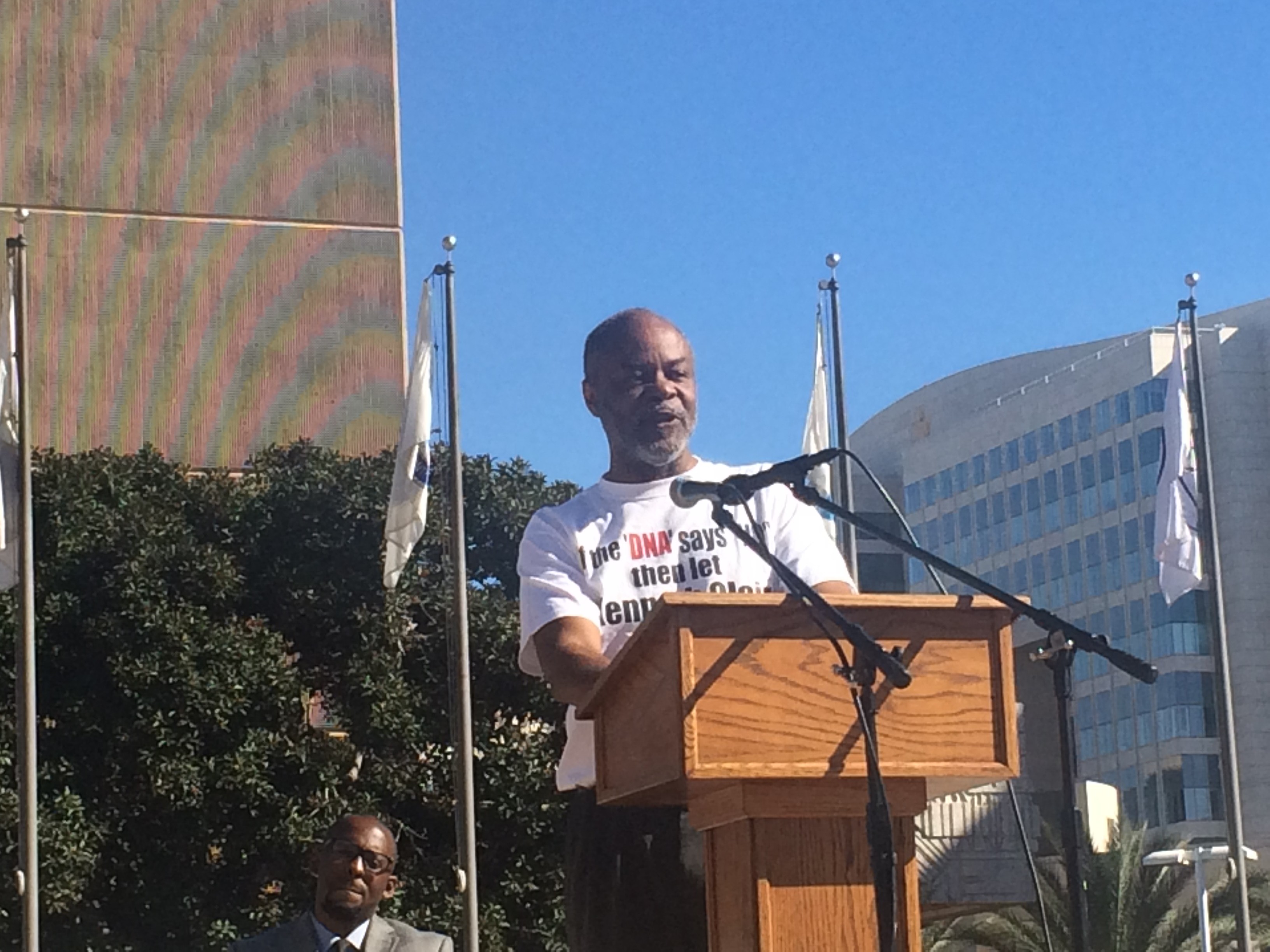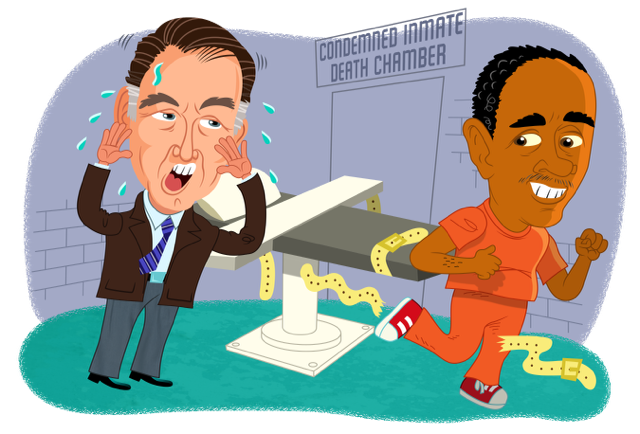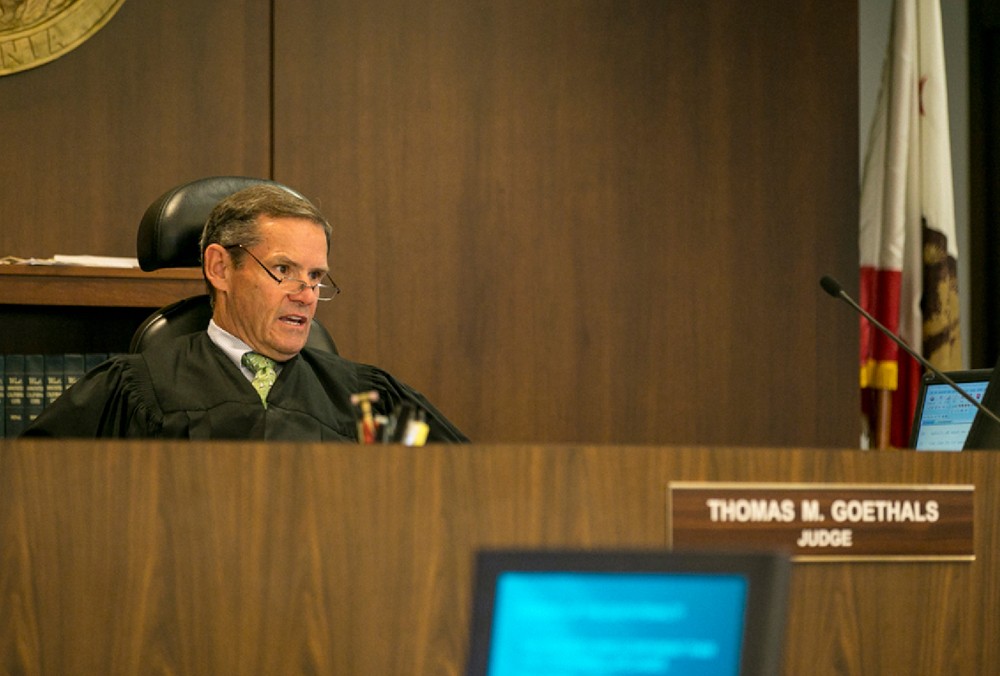

Having recently arrived from the gloomy, sun-starved section of San Quentin State Prison, Kenneth Clair wore a smile when he entered Orange County’s Central Courthouse. The inmate last visited the place when Ronald Reagan occupied the White House, the Soviet Union existed, nobody outside of Arkansas had heard of the Clintons and only a tiny portion of Americans owned cellphones. But his elation wasn’t because he was avoiding the ultimate penal-code fate for 28 years or because a federal court last year overturned his death-penalty punishment after a special circumstances murder conviction. He was happy to see family members and supporters attending a hearing in Superior Court Judge Thomas M. Goethals’ courtroom.
Clair’s attitude masked a brutal life story. Neglected as an infant in his native Louisiana, violently abused as a youngster, sent as a 17-year-old petty thief to the nation’s most horrific adult penitentiary, where the daily norm included forcible sexual assaults, he’d hoped to start a new life by moving to California in 1983. Within a year, however, authorities charged the then-25-year-old homeless man with the attempted rape, robbery and murder of a Santa Ana babysitter at an alleged white supremacist’s house. Though no physical evidence tied the dark-skinned African-American to the crime scene, and an eyewitness who saw the intruder at close range insisted the killer had been Caucasian, prosecutors succeeded in sending him to death row.
Never mind, too, that multiple other witnesses recanted anti-Clair statements, saying law-enforcement officials offered hidden incentives to utter pro-government testimony, according to court records reviewed by the Weekly. Also that police failed to seriously probe a possible connection to the rape of another nearby woman in the weeks before the killing. And that forensic scientists concluded the murderer’s clothes would have been soaked in blood, but a woman who saw Clair shortly after the crime observed nothing unusual about his appearance. And that officials supposedly lost crime-scene evidence when defense lawyers asked to study it. And that upon learning of the behind-the-scenes hanky-panky, several jurors declared they would have voted not guilty had they been fully enlightened. In a sworn declaration, one member of the citizens’ panel labeled herself disgusted she’d been hoodwinked by the Orange County district attorney’s office (OCDA).
 Fast forward to Feb. 19, when a sheriff’s deputy pushed a wheelchair carrying the knee-injured Clair into Goethals’ courtroom. Prison has taken its toll; he looks a decade older than his age, 56. A relative overcome with emotion asked if she could sit next to the handcuffed defendant at the defense table, but a bailiff shook his head no. For weeks, the judge understandably believed the hearing would require the mere technicality of resentencing Clair to a term of life in prison without the possibility for parole (LWOP).
Fast forward to Feb. 19, when a sheriff’s deputy pushed a wheelchair carrying the knee-injured Clair into Goethals’ courtroom. Prison has taken its toll; he looks a decade older than his age, 56. A relative overcome with emotion asked if she could sit next to the handcuffed defendant at the defense table, but a bailiff shook his head no. For weeks, the judge understandably believed the hearing would require the mere technicality of resentencing Clair to a term of life in prison without the possibility for parole (LWOP).
But this case just can’t escape controversy.
In an unusually secretive ruling in March 2015, the U.S. Court of Appeals for the Ninth Circuit found that Clair’s trial attorney in 1987 provided “profoundly deficient” representation. The three-judge panel then removed the death penalty, issued a protective order on involved lawyers and published an opinion devoid of key factual references that hindered readers’ ability to tie the ruling to Clair. The matter slowly returned to Orange County, where it landed in Goethals’ court for either a penalty-phase retrial or a rubberstamp LWOP determination.
What the hell was happening? The judge said, “It’s difficult to imagine what’s going on here.”
The answer wasn’t forthcoming, at least for the public. Scott Simmons, a high-ranking OCDA homicide prosecutor, and Clair’s San Francisco-based appellate lawyer, John Grele, told Goethals they couldn’t speak freely about the case in open court. For 17 minutes, they huddled in chambers. When they finished, the judge announced he’d learned “a little” more about the situation, but he didn’t offer specifics.
What we did discover is there’s an impasse. Simmons had hoped Grele would readily accept a non-contested downward departure from death to LWOP. But that outcome robs the penniless Clair of publicly provided legal counsel afforded to death-row inmates as he battles pending suspicious law-enforcement actions against him. Instead, to Simmons’ irritation, Grele announced he wants Goethals to remove the special circumstances finding so his client would receive a term no worse than 25 years to life, which could mean he’s already eligible for parole.
“This is more complicated than it initially appeared,” observed the judge.
Lurking as a backdrop to the dispute is a huge, unsolved mystery. OCDA officials asserted for years that DNA recovered from the murdered babysitter, Linda Faye Rodgers, belonged to Clair, who, they claimed, attempted to rape her, too. But in 2008 and with the defendant having served 21 years on death row at that point, their version of reality crumbled. Advances in forensic science made a startling discovery: The DNA doesn’t actually belong to Clair.
Fair-minded observers have gasped at the twist, but District Attorney Tony Rackauckas and his surrogates, Simmons and his homicide unit boss, Dan Wagner, stubbornly claim the news is irrelevant. Though the Ninth Circuit asserted there’s a possibility Clair could be factually innocent, the local prosecutors say they remain positive of his guilt. To support that stance, they point chiefly to an informant’s surreptitious recording of the defendant repeatedly proclaiming his innocence but also asking a person not to cooperate with police detectives investigating Rodgers’ death.

Simmons knows the identity of the male tied to the DNA recovered from the victim’s vagina, but he refuses to reveal it, explaining the individual was too young at the time of the killing to be guilty. He also blocked Grele’s request to inspect the name under a protective order so that he could investigate if one of the person’s older, DNA-sharing male relatives is the killer. To justify that concealment, the deputy DA declared privacy concerns supersede Clair’s due-process rights, a position he took even when a state execution loomed.
The first issue Goethals plans to tackle is whether he has jurisdiction to grant the defense motion to strike the special circumstances verdict if he eventually determines that’s the correct course. “I don’t want to engage in a meaningless exercise,” he said. Stating accuracy is more important than speed in the current scenario, the judge will study in-depth briefs from both sides. He ordered the parties to return on March 18 so he can ponder the next step in this bizarre case.
After the hearing, Clair’s relatives couldn’t hide decades’ worth of emotional scars as they slowly walked down a courthouse hallway with three reporters in tow. They appreciated that C.J. Ford—an Orange County private investigator and expert in the case—accompanied them. In their minds, the OCDA cheated to steal an innocent, underprivileged man’s freedom, and they weren’t comfortable when Goethals conducted the powwow with the lawyers outside of their presence. They even lectured the court-appointed Grele, claiming he’d callously kept them in the dark about his strategy for the session.
“After everything that has happened, I don’t trust any of them,” said Johnnie Mae Stokes, Clair’s sister, who was on the verge of tears. She paused, distraught about her sibling’s plight. “Why should I?”

CNN-featured investigative reporter R. Scott Moxley has won Journalist of the Year honors at the Los Angeles Press Club; been named Distinguished Journalist of the Year by the LA Society of Professional Journalists; obtained one of the last exclusive prison interviews with Charles Manson disciple Susan Atkins; won inclusion in Jeffrey Toobin’s The Best American Crime Reporting for his coverage of a white supremacist’s senseless murder of a beloved Vietnamese refugee; launched multi-year probes that resulted in the FBI arrests and convictions of the top three ranking members of the Orange County Sheriff’s Department; and gained praise from New York Times Magazine writers for his “herculean job” exposing entrenched Southern California law enforcement corruption.

